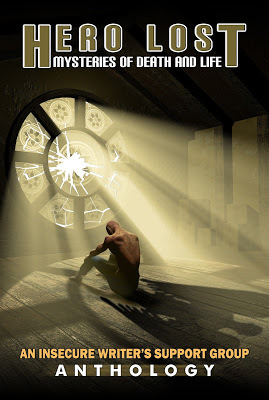Open-Ended Stories: Guest Post by Olga Godim
Today is a very special day. Half the blogosphere has a new book out. To celebrate, the very talented Olga Godim is stopping by to discuss the challenges of writing a series. After reading his post, be sure to scroll down to read all about Hero Lost: Mysteries of Death and Life.
Open-Ended Stories
By Olda Godim
If you want to write a series of stories or make the world you created for one story fit for many others, you need to make that world open-ended. I don’t mean a cliff-hanger at the end of the current plot. No, I mean a potential for future conflict, consciously introduced by the writer. There are several ways to achieve such a goal. I’ll touch on the three that are used consistently in genre fiction.
1. A story set in a small business or a shop, with the proprietor as the protagonist. It could be a PI office, but it also could be a bakery or a book store or even a school. Every customer who comes through the door is a potential catalyst of a new story. Sometimes, the protagonist knows her visitors: neighbors, schoolmates, or friends. They have common interests and frequently swap gossips, and those gossip exchanges often set up story after story. Many mystery series follow this approach, while hardly any is set in Walmart or another retail or industrial giant. The corporate business model perceives all their employees and customers as faceless, uniform, and thus diminishes the open-ended potential of a small business.
2. Protagonists with large families. Historical romance writers often adhere to this route. They concoct families with a plethora of brothers, sisters, and cousins and then proceed to write a separate novel for each sibling. A variation of this method is a group of buddies instead of a family: officers from the same unit or members of the some ladies’ club. In this case, each member carries his own story.
3. Political instability. This is the domain of speculative fiction writers. They make up their own worlds and often draw maps of such worlds. Different countries on such maps have different rules and rulers, and the potential for conflict is bottomless. Racial discrimination – yes. Territorial aggression – yes. Treachery – yes. Religious persecution – yes. Succession squabbles – yes. Dragons vs. humans – sure. Magically animated cucumbers vs. kangaroos – why not. Inexperienced writers might want to cram all of the above into one story, but the more savvy wordsmiths reserve one conflict per one story and stretch a series into years and decades of writerly bliss. Going back in history in each of their imaginary countries on their imaginary maps provides them with even more material for new stories.
My short fantasy story Captain Bulat in the anthology Hero Lost combines a couple of the techniques mentioned above. My protagonist Altenay is a Finder. She uses her magic to find lost things and people. Small business approach qualifies, and every new client of hers might turn into a new story, if I wish it.
The second potential for conflict is Altenay’s ethnicity. She is a Bessar, an ethnical minority in the kingdom where she lives. She is not worried. Young and optimistic, she thinks that every neighbor is a nice guy, and nobody would stir trouble over her hair color or her choice of headwear. She might be wrong. I, her writer, am much more attuned to the people’s moods. I’m sure some of Altenay’s neighbors dislike Bessars in general and resent Altenay’s success in her business in particular. There might be ugly tribulations ahead of my heroine. I don’t know if I ever write another story about her, but if I do, I have already created the framework for new stories and new conflicts. Just in case.
Bio:

Olga is a writer and journalist from Vancouver, Canada. Both her children, a son and a daughter, have already flown the nest. To sustain her nurturing instincts, she now collects toy monkeys. She has over 300 monkey figurines in her collection. As a journalist, Olga writes personal profiles of the local artists, actors, and musicians. As a fiction writer, she prefers fantasy. In the past few years, her fantasy and magic realism short stories have been published in multiple internet and print magazines. Her book SQUIRREL OF MAGIC is a collection of urban fantasy short stories. Her novels EAGLE EN GARDE and ALMOST ADEPT are parts of her ongoing sword-and-sorcery fantasy series. In 2015, EAGLE EN GARDE won EPIC eBook Award in the Fantasy category.
Author Links:
Website and Blog | Goodreads | Wattpad | Twitter

Blurb:
Can a lost hero find redemption?
What if Death himself wanted to die? Can deliverance be found on a bloody battlefield? Could the gift of silvering become a prison for those who possessed it? Will an ancient warrior be forever the caretaker of a house of mystery?
Delving into the depths of the tortured hero, twelve authors explore the realms of fantasy in this enthralling and thought-provoking collection. Featuring the talents of Jen Chandler, L. Nahay, Renee Cheung, Roland Yeomans, Elizabeth Seckman, Olga Godim, Yvonne Ventresca, Ellen Jacobson, Sean McLachlan, Erika Beebe, Tyrean Martinson, and Sarah Foster.
Hand-picked by a panel of agents and authors, these twelve tales will take you into the heart of heroes who have fallen from grace. Join the journey and discover a hero’s redemption!
Buy Links:
Amazon | B&N
Open-Ended Stories
By Olda Godim
If you want to write a series of stories or make the world you created for one story fit for many others, you need to make that world open-ended. I don’t mean a cliff-hanger at the end of the current plot. No, I mean a potential for future conflict, consciously introduced by the writer. There are several ways to achieve such a goal. I’ll touch on the three that are used consistently in genre fiction.
1. A story set in a small business or a shop, with the proprietor as the protagonist. It could be a PI office, but it also could be a bakery or a book store or even a school. Every customer who comes through the door is a potential catalyst of a new story. Sometimes, the protagonist knows her visitors: neighbors, schoolmates, or friends. They have common interests and frequently swap gossips, and those gossip exchanges often set up story after story. Many mystery series follow this approach, while hardly any is set in Walmart or another retail or industrial giant. The corporate business model perceives all their employees and customers as faceless, uniform, and thus diminishes the open-ended potential of a small business.
2. Protagonists with large families. Historical romance writers often adhere to this route. They concoct families with a plethora of brothers, sisters, and cousins and then proceed to write a separate novel for each sibling. A variation of this method is a group of buddies instead of a family: officers from the same unit or members of the some ladies’ club. In this case, each member carries his own story.
3. Political instability. This is the domain of speculative fiction writers. They make up their own worlds and often draw maps of such worlds. Different countries on such maps have different rules and rulers, and the potential for conflict is bottomless. Racial discrimination – yes. Territorial aggression – yes. Treachery – yes. Religious persecution – yes. Succession squabbles – yes. Dragons vs. humans – sure. Magically animated cucumbers vs. kangaroos – why not. Inexperienced writers might want to cram all of the above into one story, but the more savvy wordsmiths reserve one conflict per one story and stretch a series into years and decades of writerly bliss. Going back in history in each of their imaginary countries on their imaginary maps provides them with even more material for new stories.
My short fantasy story Captain Bulat in the anthology Hero Lost combines a couple of the techniques mentioned above. My protagonist Altenay is a Finder. She uses her magic to find lost things and people. Small business approach qualifies, and every new client of hers might turn into a new story, if I wish it.
The second potential for conflict is Altenay’s ethnicity. She is a Bessar, an ethnical minority in the kingdom where she lives. She is not worried. Young and optimistic, she thinks that every neighbor is a nice guy, and nobody would stir trouble over her hair color or her choice of headwear. She might be wrong. I, her writer, am much more attuned to the people’s moods. I’m sure some of Altenay’s neighbors dislike Bessars in general and resent Altenay’s success in her business in particular. There might be ugly tribulations ahead of my heroine. I don’t know if I ever write another story about her, but if I do, I have already created the framework for new stories and new conflicts. Just in case.
Bio:

Olga is a writer and journalist from Vancouver, Canada. Both her children, a son and a daughter, have already flown the nest. To sustain her nurturing instincts, she now collects toy monkeys. She has over 300 monkey figurines in her collection. As a journalist, Olga writes personal profiles of the local artists, actors, and musicians. As a fiction writer, she prefers fantasy. In the past few years, her fantasy and magic realism short stories have been published in multiple internet and print magazines. Her book SQUIRREL OF MAGIC is a collection of urban fantasy short stories. Her novels EAGLE EN GARDE and ALMOST ADEPT are parts of her ongoing sword-and-sorcery fantasy series. In 2015, EAGLE EN GARDE won EPIC eBook Award in the Fantasy category.
Author Links:
Website and Blog | Goodreads | Wattpad | Twitter

Blurb:
Can a lost hero find redemption?
What if Death himself wanted to die? Can deliverance be found on a bloody battlefield? Could the gift of silvering become a prison for those who possessed it? Will an ancient warrior be forever the caretaker of a house of mystery?
Delving into the depths of the tortured hero, twelve authors explore the realms of fantasy in this enthralling and thought-provoking collection. Featuring the talents of Jen Chandler, L. Nahay, Renee Cheung, Roland Yeomans, Elizabeth Seckman, Olga Godim, Yvonne Ventresca, Ellen Jacobson, Sean McLachlan, Erika Beebe, Tyrean Martinson, and Sarah Foster.
Hand-picked by a panel of agents and authors, these twelve tales will take you into the heart of heroes who have fallen from grace. Join the journey and discover a hero’s redemption!
Buy Links:
Amazon | B&N
Published on May 02, 2017 03:00
No comments have been added yet.



